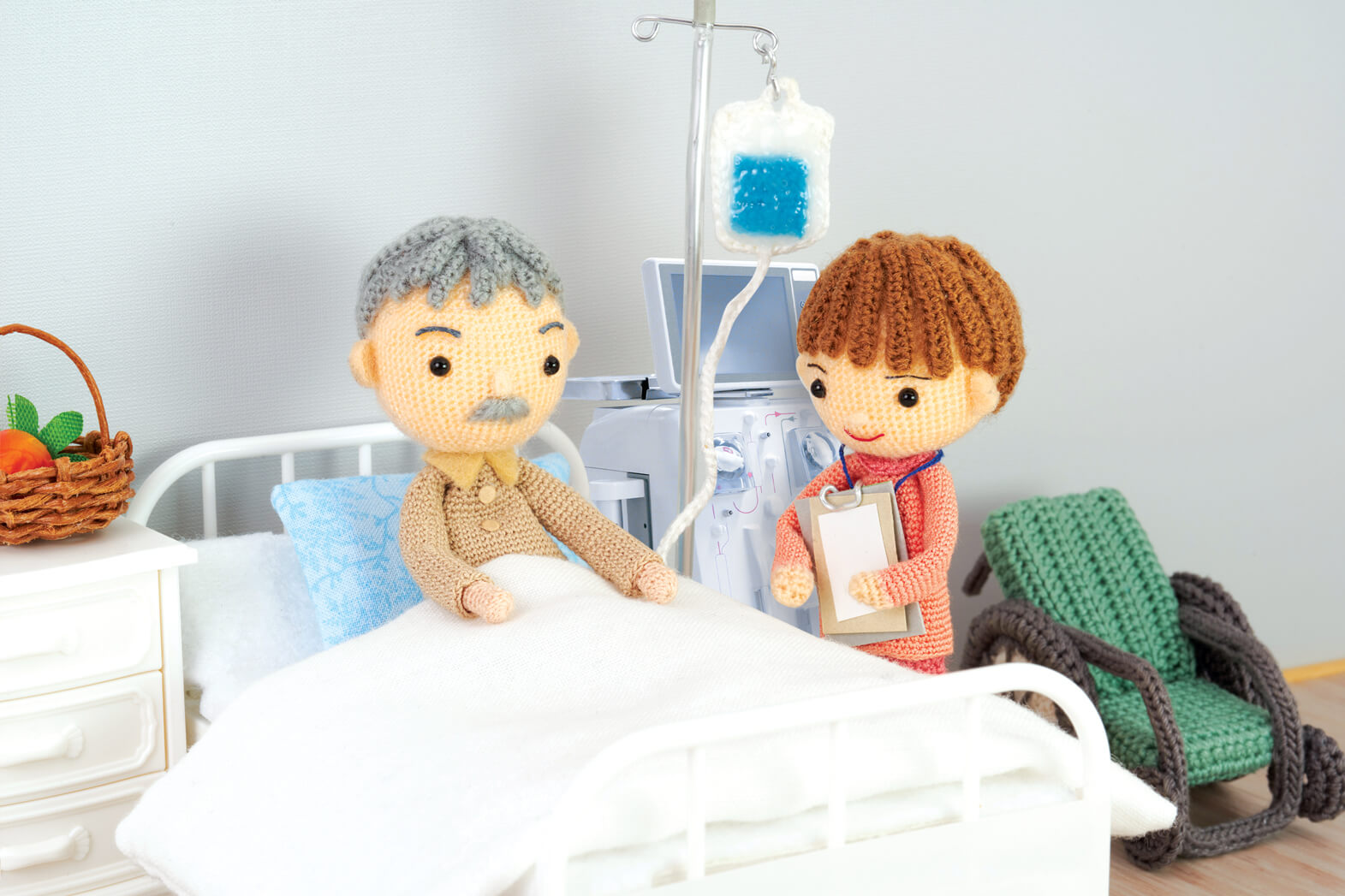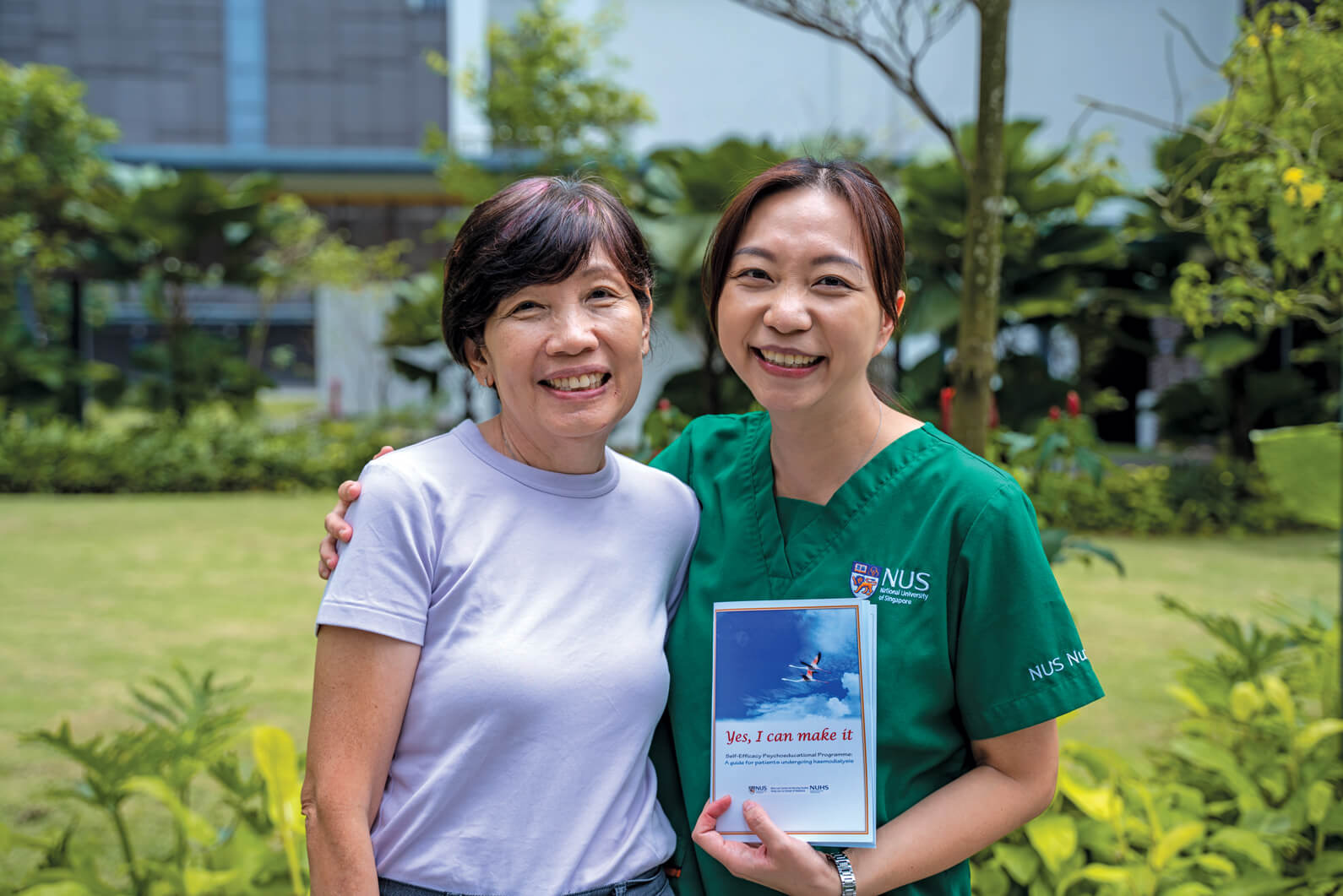Four hours a day, thrice a week. Undergoing haemodialysis treatment for kidney disease is physically as well as psychologically challenging. A study trials a possible intervention to alleviate the stress for patients.
Among the major chronic conditions, treatment for end-stage kidney disease is one of the most gruelling. Patients spend at least 12 hours a week undergoing haemodialysis—a significant amount of time considering that on average, end-stage kidney disease patients live for more than 10 years after diagnosis.
The physical and mental toll of haemodialysis treatment can also be overwhelming. As part of her PhD research, Dr Chen Hui-Chen, Senior Lecturer at the Alice Lee Centre for Nursing Studies (NUS Nursing), National University of Singapore Yong Loo Lin School Medicine, decided to investigate possible interventions that could improve treatment outcomes for these patients. “The physical demands of undergoing treatment often cause patients to face considerable anxiety and depression—which leads to reduced treatment adherence and lower health-related quality of life,” said Dr Chen.
Dr Chen’s PhD supervisor, Professor He Hong-Gu Linda commented, “We noticed that due to poor treatment adherence, some patients are repeatedly admitted to the hospital. While patients’ treatment adherence is positively associated with self-efficacy in self-care and psychological well-being, current resources were not optimally available to support them. That was when the idea to pilot a psychoeducational programme that helped these patients develop mental resilience and psychological well-being to tackle these stressors came about.”
INTERVENTION ON TWO FRONTS
The intervention includes an information booklet and spans two 90-minute sessions covering both physical and psychological health. Patients learn about medication management, food and salt restrictions, and lifestyle modifications at the first session, and abdominal breathing and positive thinking in the second. Dr Chen explained, “Through activities such as role play, discussion and goal setting, the sessions help patients understand the ‘why’ behind what they do and ‘how’ they can take a more active role in their treatment for kidney disease.
“We also equip patients with tools to identify and solve everyday challenges they face like managing their diets and medications. In particular, the I-CAN-DO method—Issues faced, Current situation, Aims, New goals I can achieve, Date to achieve and Outcome—offers a framework that patients can use to tackle problems,” Dr Chen said.
“By giving them the means to recognise and reframe their emotional state, patients can focus on what they can change instead of brooding over what they can’t,” Dr Chen continued. To support this, patients were also taught to practise daily smile exercises and abdominal breathing exercises whenever they felt anxious.
PUTTING THE METHOD INTO PRACTICE
So far, patients’ responses have been encouraging. In psychological aspects like anxiety and depression, patients have shown improvements in self-acceptance and positive self-reinforcement. One patient shared, “It’s natural to have negative thoughts sometimes. But now I know—simply by changing the way I look at things and accepting that haemodialysis is a part of my life, it is actually not a big deal. Well, I can’t be negative all the time, right?”
With better knowledge and management of their physical condition, patients have also demonstrated self-efficacy and increased treatment adherence. “The information booklet is handy. It includes important information on how to take care of my diet—what I can and cannot eat to complement my treatment. There are also charts for me to record my food and fluid intake. Now, I’m eating better and feeling more active than before,” said another patient.
WHAT COMES NEXT
Given that the number of patients on definitive dialysis in Singapore has increased significantly from 919 in 2011 to 4,507 by 30 November 2022 according to the National Kidney Foundation, increasing patients’ health-related quality of life and treatment adherence attitudes could reduce the burden on them, their caregivers and the healthcare system.
Dr Chen said, “We are encouraged by these research outcomes. But we recognised that keeping to the current face-to-face format of intervention is resource intensive and limiting in its capacity to scale-up. That is why we have plans to digitalise the intervention and make it accessible to a wider group of patients.
“The importance of being digital-ready particularly hit home when some of our activities were constrained by the COVID-19 curbs. Bringing the programme onto a digital platform will empower more patients to access the intervention whenever they want without unnecessarily taxing the existing healthcare manpower,” Dr Chen continued.
Dr He added, “That’s especially important when we are still facing a serious lack of manpower in the industry. With digitalisation, we can potentially make the intervention more cost-effective, more sustainable in the long-run and more accessible for more patients.
“Another benefit of digitalisation we are keen to explore is offering a more interactive experience. For example, we can introduce videos, or even foster patient and caregiver support communities through group chat functions. This element of peer support among patients and caregivers could well be the key to creating sustainable change in patients’ lives.”






